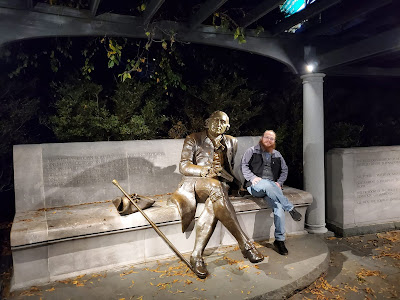Political Column - Government Solutions, Government Problems
The government is a solution to a certain set of problems. This solution then causes a different set of problems. Instead of a solution, it's more of a tradeoff between different sets of problems. The society gets to choose which hard path to take, because there are no easy options.
Governments are created as a way to find peace, as a treaty among people to have order so that rights are not violated. For peace to continue to exist there must be certain things, there must be a fair amount of mutual agreement about rights and justice. Governments often lose their way.
Police are very important. They protect the rights of citizens from other citizens. They are a bulwark against the monster of chaotic anarchy and lawlessness in which there are no rights and no protection. Yet, the Supreme Court has ruled multiple times that the police have no duty to protect people (see DeShaney v. Winnebago County, 1989; Castle Rock v. Gonzales, 2005). You can't lie to the police, that would be a crime, but the police can lie to you. These things are legal, but they are not moral.
Things like zoning and building codes are implemented for reasons, good reasons. But, there are unintended secondary and tertiary consequences. The solution to one set of problems creates a second set of problems. Availability and accessibility to housing is a great example.
There is a housing shortage. To correct this people look to the government, not realizing that there is a housing shortage because of the government. There are layers upon layers of regulation concerning everything to do with building housing. Rather than having the government build housing (communism) or run the companies that build housing (fascism) or cut special deals with certain companies to give them an advantage while creating barriers to other companies (crony capitalism), which are all bad options, it's good to reassess the restrictions that are in place; evaluate their utility, how they may be creating a disadvantage for people, and how to remedy it.
There are things that are within township power, and things that are outside of township control. Tiny homes are becoming popular, they can be less expensive to build and maintain. They are illegal in Dalton because we have minimum square footage for housing. Having a small living unit on the same parcel as a house for an in-law is becoming popular, these are called accessory dwelling units. But, it's illegal to do that in Dalton. Having just a camper on a piece of land is a concern because of waste disposal and is therefore illegal in Dalton. All of these are currently being discussed, with a view to tackling the legitimate concerns, because a change in these laws can make housing more available and accessible by reducing the regulations that are causing the problem in the first place.
Lack of food is another great example. People look to the government to be the savior, when often the best thing for government policy would be to get out of the way of the initiative of the people who can and must be the ones to solve the problem. Instead of having the government run farms and stores (communism) or direct the companies that operate farms and stores (fascism) or create unfair advantages for some companies and unfair hindrances for others (crony capitalism), it's possible to step back the restrictions that are holding back access and availability of food. Local individual production, processing, and exchange make a community resilient. This is why the township is discussing a food sovereignty ordinance to protect the right that people have to produce and trade food.
It's true that each of these solutions generates another set of problems. That's always true. What we must seek to do is operate from principles that allow us to pursue the best path forward, to choose the set of problems that we want to deal with. Rather than looking for the easy path, we can evaluate the tradeoffs, and choose our hard.
________________________________________________




Comments
Post a Comment